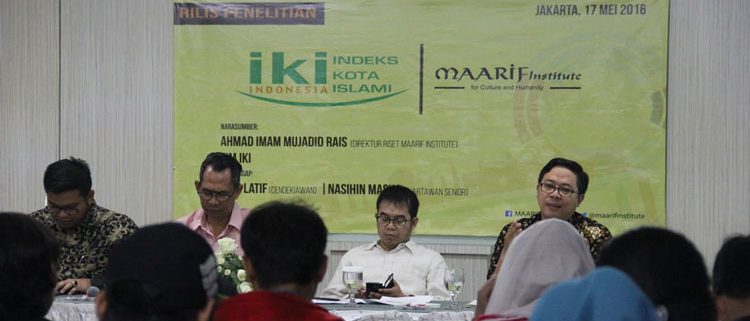Cities that embody sharia-based local regulations in Indonesia have failed to implement the best practices of Islamic values in their governance, says the Islamic City Index report published by the Maarif Institute.
The institute launched the index by assessing local regulations and documents from government institutions, as well as interviewing selected local figures, to see whether they fulfilled the Islamic city indicators, namely security, welfare and happiness, in their public services and governance.
The indicators referred to Islamic principles written in the Koran and hadiths, starting from the view of Islam asRahmatan lil alamin ( blessing for the universe ), which upholds governance in line with citizens development, Maarif Institute research director Ahmad Imam Mujadid Raid said.
The study sought to assess the numerous local governments that have begun to develop local regulations by referring to sharia, while at the same time, the mayors had the responsibility to focus on developing the human resources, education and well-being of the people, Ahmad said.
“We want to see whether a city that implements sharia-based regulations becomes a true Islamic city or not,” Ahmad told the journalists on Tuesday.
In overall score, Yogyakarta, Bandung and Denpasar ranked as the best cities with scores of 80.64 out of 100, with local regulations and public services that fulfilled the criteria of Islamic cities, while Kupang, Padang and Makassar occupied the three lowest positions scoring 59.39, 58.37 and 51.28 respectively.
Despite numerous cases of intolerance in Yogyakarta over the past few years, Ahmad said, the reason why the city scored the highest was because in other respects such as education, income, and health, which comprised the welfare indicator, the city performed well.
In Makassar, happiness was the indicator that contributed to its lowest position in the index, with a score of only 37.5, since the city did not have specified regulations regarding environmental management or good spatial planning, which reduced the harmony between the citizens and nature, Ahmad added.
Meanwhile, particularly in the security indicator, which comprised the freedom to exercise beliefs and religion, law enforcement and the fulfillment of political rights of women, children and disabled people, Serang ranked the highest with a score of 82.5.
Scholar Yudi Latif said the fact that cities with sharia-based local regulations did not meet the criteria to be dubbed Islamic cities showed that the local governments might just be using religion as a shield to conceal their inability to develop the city and benefit residents.
“It seems like an over-compensation when the city fails to deliver security, welfare and happiness for its people. [The local government] immediately covers it up with formal claims, saying it implements Islamic values in governance,” Yudi said.
However, Yudi said, given that the study had mainly relied on local government data, it could be improved by collecting more information on public perceptions of public services since the indicators, particularly happiness, were subjective.
Welfare and security should not be seen in just generic terms because the most important thing was that development should be visible and benefit local residents, Yudi said. ( bbn )




Leave a Reply
Want to join the discussion?Feel free to contribute!